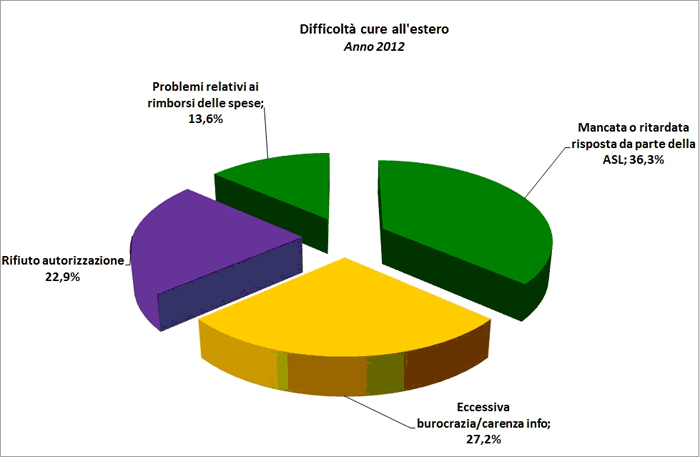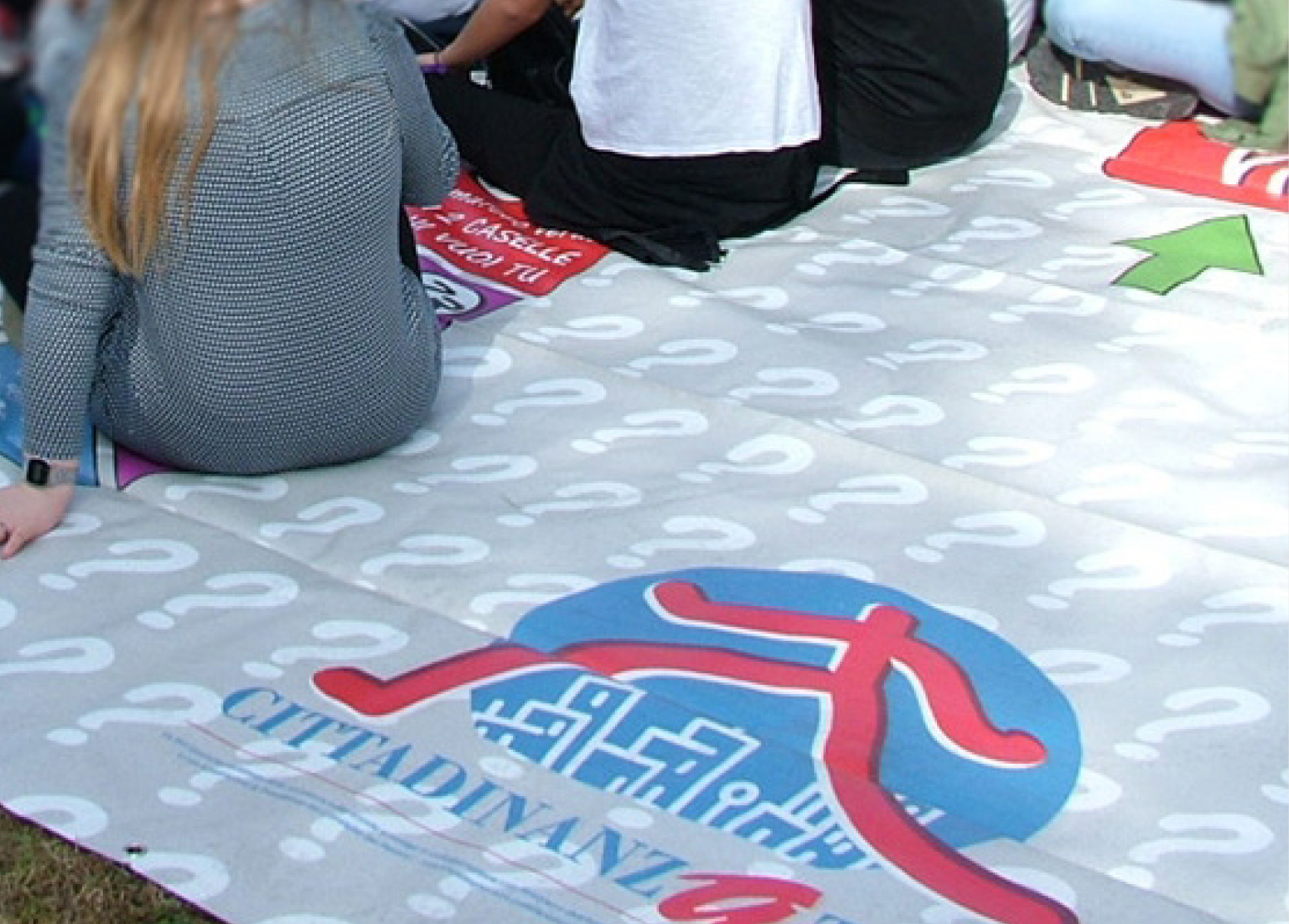Be cured abroad: what happens today in Italy, in the picture provided by the Report PiT health
The Report PiT health is the main instrument through which Cittadinanzattiva-Legal advice for the Sick every year provide a photograph of the National Health from the point of view of the citizen.
The Report PiT is in fact realized through the collection and processing of complaints from citizens who annually contact the service PiT Health, the headquarters of the local TDM services PiT.
The purpose of the report is threefold:
- to provide the public, citizens, and those who exercise significant roles in the Health Service and the welfare system in general, data and information on the relationship between citizens and the health care system, according to an approach that focuses on the condition of users and services;
- verify the impact of policies and programs, identify priorities, address public spending, direct regional planning and management of healthcare organizations, guide policies of citizens;
- guiding programs and actions of the Court on the Rights of the Sick, the National Coordination of Associations of the chronically ill (CnAMC), and the whole Cittadinanzattiva.
Obviously, the data collected and presented annually are not relevant from a statistical point of view, but they constitute a sort of thermometer of the most significant situations of uneasiness with which citizens are measured in their contact with the health services, and can therefore be considered to be significant indicators of the themes to focus attention on in the panorama of the Italian health and regional level. Following the elaboration of reports received in 2012 on the issue of international mobility for health reasons.
Analysis of the data come to the PiT health, in 2012
The analysis below refers to the 269 reports received in 2012 on the issue of health care abroad, they are stories of people who have applied to the Court for the rights of the patient to obtain information, advice and assistance to resolve difficulties access to healthcare across the border.
Fig 1 - Problems faced by citizens in mobility for treatment abroad (EU)

Source: Prepared reports PiT Health-Cittadinanzattiva 2012
Reports of citizens, collected in 2012 by the National Health Service PiT and the headquarters of the Tribunal for Patients' Rights in the area, confirm the existence of serious difficulties to travel abroad to receive treatment.
Most of the difficulty concerns the need to obtain permission from the ASL to be able to go abroad, and 36.3% are in fact its failure or delay in receipt of the authorization.
In particular, this aspect will not only affect the ability to access, within reasonable time, therapies useful to the citizen, but also emphasizes the procedural issues pertaining to the ASL. The procedure to obtain the authorization is to present steps that will inevitably require waiting times.
In some cases the failure or delay in receiving a response from the ASL becomes dysfunctional, confusing the citizens and endangers his health.
Another aspect pointed out by the citizens, as particularly problematic, concerns the bureaucracy and the lack of information (27.2%) to complete the entire process, which involves many steps in most of the times unclear to citizens. First of them is the need to obtain medical certificates justifying the need to travel cross-border structures, then there is an obligation to provide specific authorization application ASL, so it is necessary to wait for the opinion of the regional center of reference, which assesses the admissibility of the claim, to get to the formal response by the ASL (authorization or denial).
The citizen tells us that in some cases is aware of the possibility to go abroad to get care by other patients met by chance during the course of treatment, or, in a fragmented way, by family doctors and specialists, sometimes from searches on the Internet.
For the 22.9% of the citizens who addressed the protection of our branches, the main problem is to have already had to find that the ASL had not authorized the care. This is a real tragedy for the citizens because they faced with the stark choice of having to give up treatment, or having to pay out of his own travel, accommodation, intervention (or therapy visit, etc.). For many, this solution is not viable because the cost of treatment abroad can be very high. Most of the time the denials are justified by the fact that the regional center of reference in Italy believes that structures that are present, like the foreign structure proposal, are able to perform the required performance. Following this answer, inevitably we record the skepticism of citizens who have received different opinions in the course of their medical history and meeting with specialists. Often, it is known that in Italy is viable therapy, the waiting times to obtain strongly appear incongruous with their need; representing a veritable inaccessibility equal to the inexistence of adequate services. Last issue, which in statistical terms we were able to highlight, is the difficulty in obtaining refunds (13.6%) for anticipated expenses of their own pockets. In a time of economic and financial crisis that affects so heavily in the economic management of the families, this aspect is of particular relevance. Citizens in some cases had to access to loans and grants in order to advance the costs of travel and the delay in getting their refund, and this means to further put at risk the serenity of a family.
Causes of mobility to EU countries
Reasons for going abroad: |
% |
|
Surgical intervention |
35 |
|
Innovative therapy |
29 |
|
Diagnostics |
18 |
|
Specialized |
13 |
|
Transplantation |
5 |
|
Total 100 |
100 |
Source: Prepared reports PiTSalute-Cittadinanzattiva 2012
The reasons for citizens to seek care outside the region are mainly related to the need for highly specialized surgeries (35%). It is often the technique used, such as minimally invasive techniques or innovative, to require the need to go abroad. Follows with 29% of reports to the need to go abroad to access treatment (experimental rehabilitation) considered innovative by the scientific community, or if there are valid therapeutic alternatives in Italy. Follows with 18% of the entry for the diagnosis in many cases citizens traveling abroad to be able to get once and for all a certain diagnosis, which would finally lead to the identification of appropriate treatment. Very often we are faced with people with rare diseases who are struggling to get an accurate diagnosis. In latest reports concerning transplantation with 5%. Still difficulties, especially related to waiting times leads people to request the provision outside border.
Main reasons for therapeutic areas
Therapeutic Area |
% |
|
Oncology |
32 |
|
Neurological diseases |
30 |
|
Rare diseases |
17 |
|
Cardiology |
13 |
|
Orthopedics |
8 |
|
Total |
100 |
Source: Prepared reports PiTSalute-Cittadinanzattiva 2012
With regard to the therapeutic areas that suffer especially the difficulties related to the procedures for the authorization of health care abroad, we find: the oncological diseases with 32%, followed by neurological disorders (30%). In here are often children, suffering from degenerative pathologies which require innovative therapies. Even patients suffering from rare disease (17%). In this case, as anticipated, citizens go abroad to obtain an accurate diagnosis or a treatment that is not yet practiced in Italy. Follow patients with heart disease (13%) and with problems of Orthopaedic (8%).
Traslations:
Difficoltà cure all'estero Anno 2012: Difficulty health care abroad year 2012
Problemi relativi ai rimborsi delle spese: Problems relating to the reimbursement of costs;
Mancata o ritardata risposta da parte dell'ASL: Failure or delay in response from the ASL
Rifiuto autorizzazione: Rejection of authorization
Eccessiva burocrazia / carenza info: Excessive bureaucracy / lack of information
(Written in October 2013)











